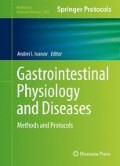Abstract
The Apc min/+ mouse provides an excellent experimental model for studying genetic, environmental, and therapeutic aspects of intestinal neoplasia in humans. In this chapter, we will describe techniques for studying colon cancer development in Apc min/+ mice on C57BL/6J (B6) background, focusing on the roles of environmental modifiers, including Dextran Sulfate Sodium (DSS), high fat diet, and bile acid supplementation in the context of experimental colorectal cancer. This chapter also includes protocols describing extraction and purification of DSS-contaminated RNA, as well as sampling, harvesting, and tissue processing. The common pathologic lesions encountered in these animals are described in detail.
Access this chapter
Tax calculation will be finalised at checkout
Purchases are for personal use only
References
American Cancer Society (2014) Colorectal cancer facts & figures 2014–2016. American Cancer Society, Atlanta, GA
American Cancer Society (2015) Surveillance research, 2015. American Cancer Society, Atlanta, GA
Jasperson KW, Tuohy TM, Neklason DW et al (2010) Hereditary and familial colon cancer. Gastroenterology 138:2044–2058
Chan AT, Giovannucci EL (2010) Primary prevention of colorectal cancer. Gastroenterology 138:2029–2043
Ullman TA, Itzkowitz SH (2011) Intestinal inflammation and cancer. Gastroenterology 140:1807–1816
Walter V, Jansen L, Hoffmeister M et al (2014) Smoking and survival of colorectal cancer patients: systematic review and meta-analysis. Ann Oncol 25:1517–1525
Pino MS, Chung DC (2010) The chromosomal instability pathway in colon cancer. Gastroenterology 138:2059–2072
Liang J, Lin C, Hu F et al (2013) APC polymorphisms and the risk of colorectal neoplasia: a HuGE review and meta-analysis. Am J Epidemiol 177:1169–1179
Taketo MM, Edelmann W (2009) Mouse models of colon cancer. Gastroenterology 136:780–798
Moser AR, Pitot HC, Dove WF (1990) A dominant mutation that predisposes to multiple intestinal neoplasia in the mouse. Science 247:322–324
Bilger A, Shoemaker AR, Gould KA et al (1996) Manipulation of the mouse germline in the study of Min-induced neoplasia. Semin Cancer Biol 7:249–260
Khazaie K, Zadeh M, Khan MW et al (2012) Abating colon cancer polyposis by Lactobacillus acidophilus deficient in lipoteichoic acid. Proc Natl Acad Sci U S A 109:10462–10467
Shoemaker AR, Gould KA, Luongo C et al (1997) Studies of neoplasia in the Min mouse. Biochim Biophys Acta 18:F25–48
Cooper HS, Everley L, Chang WC et al (2001) The role of mutant Apc in the development of dysplasia and cancer in the mouse model of dextran sulfate sodium-induced colitis. Gastroenterology 121:1407–1416
Giammanco A, Blanc V, Montenegro G et al (2014) Intestinal epithelial HuR modulates distinct pathways of proliferation and apoptosis and attenuates small intestinal and colonic tumor development. Cancer Res 74:5322–5335
Tanaka T, Kohno H, Suzuki R et al (2006) Dextran sodium sulfate strongly promotes colorectal carcinogenesis in Apc(Min/+) mice: inflammatory stimuli by dextran sodium sulfate results in development of multiple colonic neoplasms. Int J Cancer 118:25–34
Xie Y, Matsumoto H, Nalbantoglu I et al (2013) Intestine-specific Mttp deletion increases the severity of experimental colitis and leads to greater tumor burden in a model of colitis associated cancer. PLoS One 8, e67819
Baltgalvis KA, Berger FG, Pena MM et al (2009) The interaction of a high-fat diet and regular moderate intensity exercise on intestinal polyp development in Apc Min/+ mice. Cancer Prev Res 2:641–649
Day SD, Enos RT, McClellan JL et al (2013) Linking inflammation to tumorigenesis in a mouse model of high-fat-diet-enhanced colon cancer. Cytokine 64:454–462
Newberry EP, Xie Y, Kennedy SM et al (2006) Protection against Western diet-induced obesity and hepatic steatosis in liver fatty acid-binding protein knockout mice. Hepatology 44:1191–1205
Cao H, Luo S, Xu M et al (2014) The secondary bile acid, deoxycholate accelerates intestinal adenoma-adenocarcinoma sequence in Apc (min/+) mice through enhancing Wnt signaling. Fam Cancer 13:563–571
Mahmoud NN, Dannenberg AJ, Bilinski RT et al (1999) Administration of an unconjugated bile acid increases duodenal tumors in a murine model of familial adenomatous polyposis. Carcinogenesis 20:299–303
Kerr TA, Ciorba MA, Matsumoto H et al (2012) Dextran sodium sulfate inhibition of real-time polymerase chain reaction amplification: a poly-A purification solution. Inflamm Bowel Dis 18:344–348
Dharmarajan S, Newberry EP, Montenegro G et al (2013) Liver fatty acid-binding protein (L-Fabp) modifies intestinal fatty acid composition and adenoma formation in ApcMin/+ mice. Cancer Prev Res 6:1026–1037
Atlas of Laboratory Mouse Histology (2004) Texas histopages. http://ctrgenpath.net/static/atlas/mousehistology
Preston SL, Leedham SJ, Oukrif D et al (2008) The development of duodenal microadenomas in FAP patients: the human correlate of the Min mouse. J Pathol 214:294–301
Acknowledgment
Work cited in this review was supported by the following grants: HL38180, DK56260 and Digestive Disease Research Core Center P30DK52574 to N.O.D.
Author information
Authors and Affiliations
Corresponding author
Editor information
Editors and Affiliations
Rights and permissions
Copyright information
© 2016 Springer Science+Business Media New York
About this protocol
Cite this protocol
Nalbantoglu, I., Blanc, V., Davidson, N.O. (2016). Characterization of Colorectal Cancer Development in Apc min/+ Mice. In: Ivanov, A. (eds) Gastrointestinal Physiology and Diseases. Methods in Molecular Biology, vol 1422. Humana Press, New York, NY. https://doi.org/10.1007/978-1-4939-3603-8_27
Download citation
DOI: https://doi.org/10.1007/978-1-4939-3603-8_27
Published:
Publisher Name: Humana Press, New York, NY
Print ISBN: 978-1-4939-3601-4
Online ISBN: 978-1-4939-3603-8
eBook Packages: Springer Protocols

